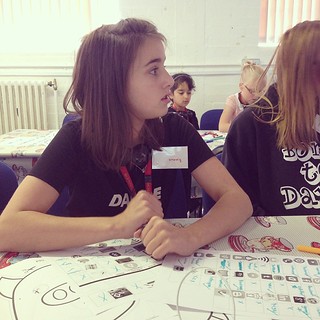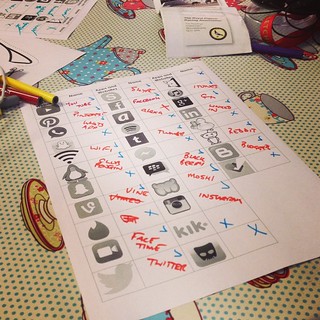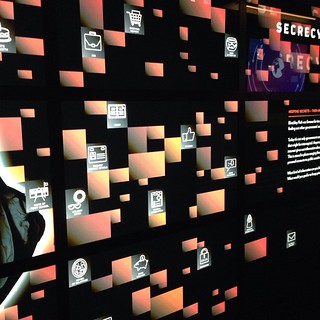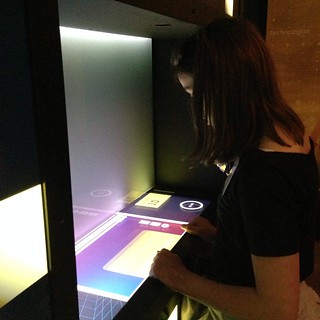Our recent trip to Bletchley Park included a visit to the McAfee Cyber Security Exhibition, to explore the reality of online information sharing and child safety on the internet. It’s quite an interesting (and very clever!) partnership, the codebreakers of the past combining with the code protectors of the present and future. In addition to the display and interactive material, we also attended an online safety education workshop with Nicola Halls, the in-house education officer, which most of my girls came to – one of them because I decided it would be a good idea after a recent transgression – which was quite an eye opener for me too.
The exhibition area itself was fantastic I thought and provided masses of talking points for us.
This display got us talking lots and followed on from a discussion I had with my smart phone enabled girls a while back about the danger of having personal information freely available online and location enabled. The Foursquare and Facebook combination was discussed widely a few years ago and would now apply to most apps; it is all too easy to share personal information and your location and be pinpointed quickly by someone who might abuse it. This particular display highlighted how much personal information we can casually share online in the course of public conversations that are entirely innocuous – name of your rabbit, where you were born, your mum’s interesting maiden name (that perhaps someone could pick up easily just from checking your Facebook relationships), your first car, where you went to school..
Sound familiar?
Oh yes, you just gave away every banking security question you’ll ever get asked. Pause for thought indeed 🙄 And you wonder why you have to have a banking dongle and a 16 digit entry code to your banking now!
There was another really interesting data collection display that asked us to consider who should be entitled to information about our online activities and under what circumstances; watching a variety of families navigating them and becoming increasingly unsure about seemingly simple questions got us talking – should be possibly dubious be enough to allow the police to check our records? When do we cross the line?
We didn’t have time to get all round the display but there was lots to look at; danger points, places where stranger danger comes into our home, virus protection and more. It was an excellently constructed exhibit, well worth the time.
After that we moved on to the safety workshop.

One of the girls recently made a (well intentioned) error of judgement regarding online behaviour that resulted in a total loss of gadgets and social media access for her own protection as well as for a punishment. It’s frighteningly easy for children not to realise that a foolish error online can spill over into danger at school, upset, danger walking home and even impact their right to be in their school. On this occasion it might have even involved the police, never mind making her look a royal idiot in front of her family members. This workshop which involved looking at app icons, among other things, reminded me how quickly online life moves on – I was totally unaware of the brand image of Snapchat and a number of others and it brought home to me that even feeling very online savvy, there is lots of it that is accessed by younger users that I’m unaware of and which, by the nature of the environments, has less natural adult policing occurring at user level.

I was relieved the girls were all oblivious to the dating app icons though (or very good actresses!)
Nicola reminded the children that online life is a little like a street, going to another website is like leaving your home and going down the street to a stranger’s house – different rules, different personal safety, different comfort zones. I think it is equally relevant to say all online transactions, chatting, signing in, information given out, are a little like opening a window of your own home – interesting and refreshing but a security risk. Nicola cautioned them to STOP. THINK. CONNECT. when engaging online.
Statistics from McAfee and Anti-Bullying Alliance research (Nov 2013):
o Half (45%) of parents are concerned about their child being bullied online
o Two-fifths (38%) of parents think that their child may have been bullied online
o A third (33%) of parents think their child may be a cyber-bully themselves
o Over half (53%) of children often go online without any parental supervision
o Nearly one in five (16%) of children have experienced mean or cruel behaviour online
You can read more about our day at Bletchley Park on Patch of Puddles.
Disclosure: we were invited by McAfee to spend the day with them.


Leave a Reply